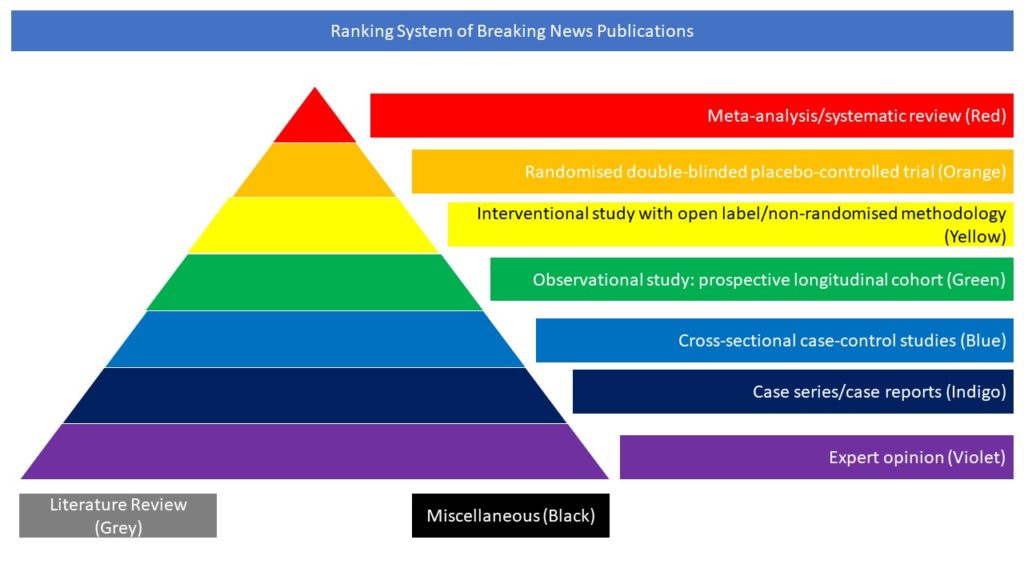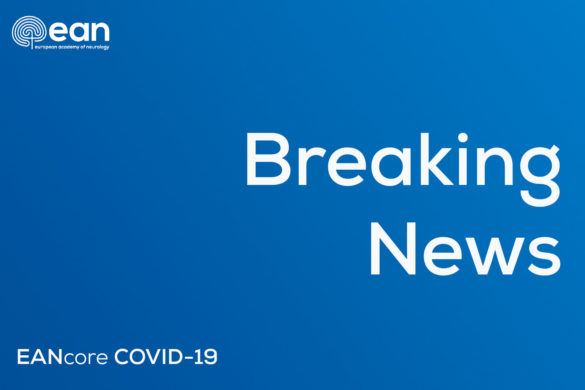Randomised double-blinded placebo-controlled trial (Orange)
Evidence suggests a role for excessive inflammation in COVID-19 complications. Colchicine is an oral anti-inflammatory medication beneficial in gout, pericarditis, and coronary disease. In this article the authors aimed to investigate the effect of colchicine on the composite of COVID-19-related death or hospital admission. The present study is a phase 3, randomised, double-blind, adaptive, placebo-controlled, multicentre trial. The study was done in Brazil, Canada, Greece, South Africa, Spain, and the USA, and was led by the Montreal Heart Institute. Patients with COVID-19 diagnosed by PCR testing or clinical criteria who were not being treated in hospital were eligible if they were at least 40 years old and had at least one high-risk characteristic. The randomisation list was computer-generated by an unmasked biostatistician, and masked randomisation was centralised and done electronically through an automated interactive web-response system. The allocation sequence was unstratified and used a 1:1 ratio with a blocking schema and block sizes of six. Patients were randomly assigned to receive orally administered colchicine (0·5 mg twice per day for 3 days and then once per day for 27 days thereafter) or matching placebo. The primary efficacy endpoint was the composite of death or hospital admission for COVID-19. Vital status at the end of the study was available for 97·9% of patients. The analyses were done according to the intention-to-treat principle. Trial enrolment began in March 23, 2020, and was completed in Dec 22, 2020. A total of 4488 patients (53·9% women; median age 54·0 years, IQR 47·0–61·0) were enrolled and 2235 patients were randomly assigned to colchicine and 2253 to placebo. The primary endpoint occurred in 104 (4·7%) of 2235 patients in the colchicine group and 131 (5·8%) of 2253 patients in the placebo group (odds ratio [OR] 0·79, 95·1% CI 0·61–1·03; p=0·081). Among the 4159 patients with PCR-confirmed COVID-19, the primary endpoint occurred in 96 (4·6%) of 2075 patients in the colchicine group and 126 (6·0%) of 2084 patients in the placebo group (OR 0·75, 0·57–0·99; p=0·042). Serious adverse events were reported in 108 (4·9%) of 2195 patients in the colchicine group and 139 (6·3%) of 2217 patients in the placebo group (p=0·051); pneumonia occurred in 63 (2·9%) of 2195 patients in the colchicine group and 92 (4·1%) of 2217 patients in the placebo group (p=0·021). Diarrhoea was reported in 300 (13·7%) of 2195 patients in the colchicine group and 161 (7·3%) of 2217 patients in the placebo group (p<0·0001). In community-treated patients including those without a mandatory diagnostic test, the effect of colchicine on COVID-19-related clinical events was not statistically significant. Among patients with PCR-confirmed COVID-19, colchicine led to a lower rate of the composite of death or hospital admission than placebo. Given the absence of orally administered therapies to prevent COVID-19 complications in community-treated patients and the benefit of colchicine in patients with PCR-proven COVID-19, this safe and inexpensive anti-inflammatory agent could be considered for use in those at risk of complications. Notwithstanding these considerations, replication in other studies of PCR-positive community-treated patients is recommended.
Tardif JC, Bouabdallaoui N, L’Allier PL, Gaudet D, Shah B, Pillinger MH, Lopez-Sendon J, da Luz P, Verret L, Audet S, Dupuis J, Denault A, Pelletier M, Tessier PA, Samson S, Fortin D, Tardif JD, Busseuil D, Goulet E, Lacoste C, Dubois A, Joshi AY, Waters DD, Hsue P, Lepor NE, Lesage F, Sainturet N, Roy-Clavel E, Bassevitch Z, Orfanos A, Stamatescu G, Grégoire JC, Busque L, Lavallée C, Hétu PO, Paquette JS, Deftereos SG, Levesque S, Cossette M, Nozza A, Chabot-Blanchet M, Dubé MP, Guertin MC, Boivin G; COLCORONA Investigators. Colchicine for community-treated patients with COVID-19 (COLCORONA): a phase 3, randomised, double-blinded, adaptive, placebo-controlled, multicentre trial. Lancet Respir Med. 2021 May 27:S2213-2600(21)00222-8. doi: 10.1016/S2213-2600(21)00222-8











